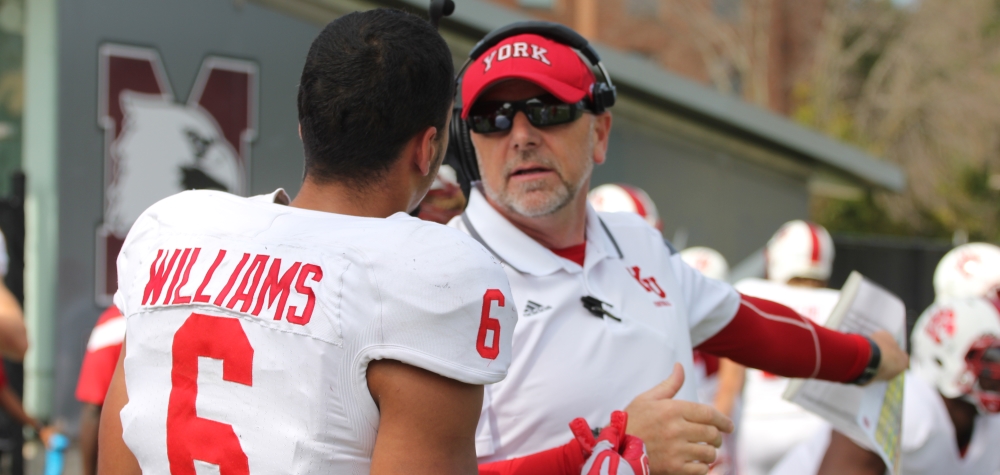3 Common Mistakes Football Coaches Make in the Weight Room
Football weight room culture is rooted in hard work and mental toughness. Makes sense in a game so physically demanding for a grin-and-bear-it mentality to supersede more conservative training protocols in favor of punishment sprints and 5am workouts. But sometimes football culture can get in the way of actual performance on the field, when it comes to preparing athletes the right way for football. Here are 3 common training mistakes that many football coaches make in the weight room—and why it might be time for a slightly different approach.
1.
- Train ‘til You Puke
A friend was recently telling me about a particular conditioning drill from his college football days that involved five cones and a trash can. When I asked what the trash can was for, he said, “So we could puke without needing to run to the sideline.”
The practice of running your athletes so hard that they need to vomit mid-session has gone the way of the buffalo—and for very good reason. While working hard is important for making positive training adaptations, working TOO hard—to the point of puking—can be dangerous.
First, training at grueling intensities, whether it’s in the weight room on the field, is impossible to maintain in the long-term. It’s simple too stressful for the human organism, and can lead to overreaching and eventually overtraining, at which point you’ll see a DECREASE in your athletes’ performance.
Second, any time you’re asking players to maintain a high power output over a long period of time without adequate recovery between reps sets, you’re going to get sub-par form. Much like going for an hour-long jog only teaches athletes how to run poorly at sub-maximal tempos (see my article on “Cardio” for Football Athletes for more info), having your athletes slog through anaerobic-lactic workouts simply to “build mental toughness” ensures they won’t have the energy or body control to maintain good technique. That means they’re practicing moving with broken or faulty patterns (which can potentially lead to injury over time), over and over. And the only adaptation that trains is their ability to run with poor form—not what you want during competition.
Lastly, a “train ‘til you puke” mindset teaches athletes the wrong message about rest and recovery. In football, an athlete’s ability to recover—between plays, but also between weekly games—is critical to their continued success. Careers are made (and broken) on a player’s ability to recover quickly. Training at high intensities with insufficient rest can teach players that “tough guys don’t need rest,” and other dated stereotypes about the masculinity of physical pain. Instead, help your athletes learn to govern themselves: have a plan for each training session, focus on the actual adaptation being trained, and make sure your players observe the right amount of rest between reps and sets. Trash cans are for trash—not puke.
There Are No Days Off
This one goes hand-in-hand with mistake #1. But even if you’re not working at supra-maximal intensities every day, football athletes still shouldn’t be in the weight room or on the field every day of the week.
The human organism needs time to make the necessary physiological changes that result in better performance (bigger muscle fibers, stronger connective tissues, etc.). When you don’t remove the training stimulus, the body can’t make those adaptations—and pretty soon you’ll start seeing your kids getting sick, getting hurt, growing weaker, and feeling too sore to train effectively.
As the authority figures, coaches need to model healthy mindsets and attitudes about training. Don’t only focus on teaching athletes how to work hard; chances are, hard work comes easy to them. They’ve already got that competitive drive—what they need is help channeling that drive in a way that physiologically allows them to perform their best when it matters most. Don’t be scared of easy days, or off days! Rest and recovery is essential for performance, period.
Also, athletes only have a certain amount of “currency” to spend when it comes to physical development. If you spend it all without taking time off to replenish your funds, you’re going to be bankrupt pretty quick. And it may not happen this week, or next week—but if you train every single day, you’ll eventually deplete that currency, guaranteed.
Train to Get Big, Strong, and Fast—All Day, Every Day
This one’s interesting. Some coaches want to hit all the highlights in every training session—strength, power, speed, stamina, etc.—instead of focusing on one main training adaptation at a time. While this certainly keeps workouts varied and exciting for your players, it isn’t doing them much good when it comes to ACTUALLY developing those qualities in a physiological sense.
You need a plan of attack in the weight room, one far-reaching enough to account for the time it takes to develop each specific adaptation (like max strength) and the sequence in which adaptations should be layered in order to produce the best performance results on the field. For example, training hypertrophy (muscle growth) before strength allows muscle fibers to get bigger, which potentiates even greater strength gains. Likewise, power (a muscle’s ability to produce force quickly) is best developed after strength adaptations are made, when the muscle has developed the ability to produce high levels of force. This sequencing of training goals requires expertise, and is another excellent reason to train on a strength and conditioning program designed by a CSCS-certified strength coach.

The Takeaway
If you’ve made one or more of these mistakes with your athletes, you’re not alone. And the silver lining to all mistakes is that they don’t have to be repeatable. Challenge yourself to help your athletes prepare the best possible way for the game of football, even if it means butting up against long-held cultural attitudes about football training should be. Any athlete can put in the hard work; but champions know how to put in the RIGHT work, too.
Free Resource for Football Coaches
Want to learn more about Volt’s position-specific football training programs? Check out Volt’s step-by-step guide to designing safe and effective football programs: “The Ultimate Guide to Off-Season Football Training.” Written by Volt’s Sport Performance department in collaboration with our Strength Coach Advisory Board, chaired by legendary hall of fame strength coach Boyd Epley of Nebraska, this free resource is great for any coach looking to expand their knowledge about strength and conditioning for football.
About the Author
Jace Derwin, CSCS, RSCC, is the lead sport performance specialist at Volt Athletics, the official strength and conditioning provider of Football Canada and the Canadian National Teams. Volt provides individualized sport-specific training programs to athletes and teams, built by certified strength coaches, through Volt’s intelligent training system. To learn more about Volt, visit www.voltathletics.com and follow Volt on Facebook, Twitter, and Instagram for more training tips.







